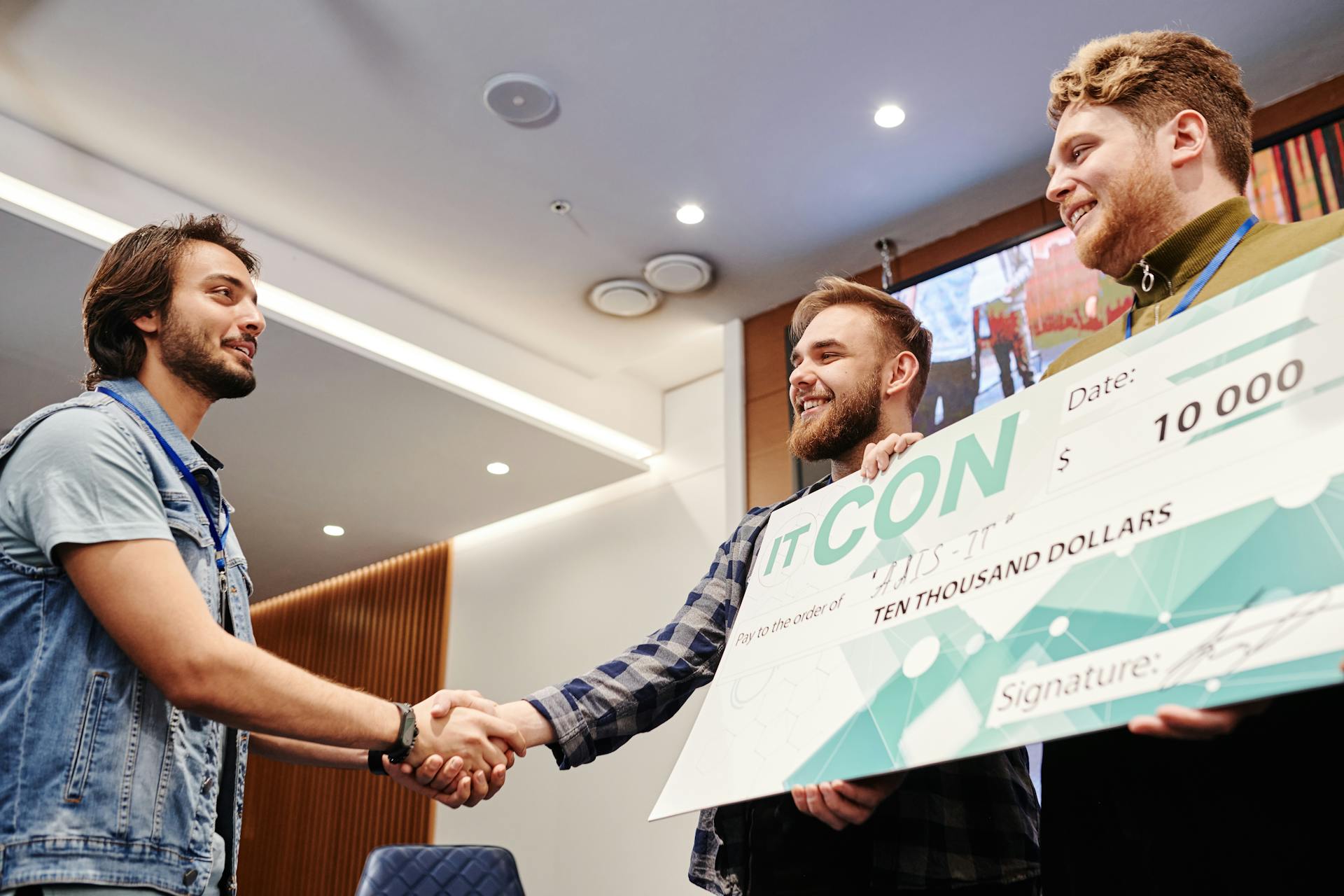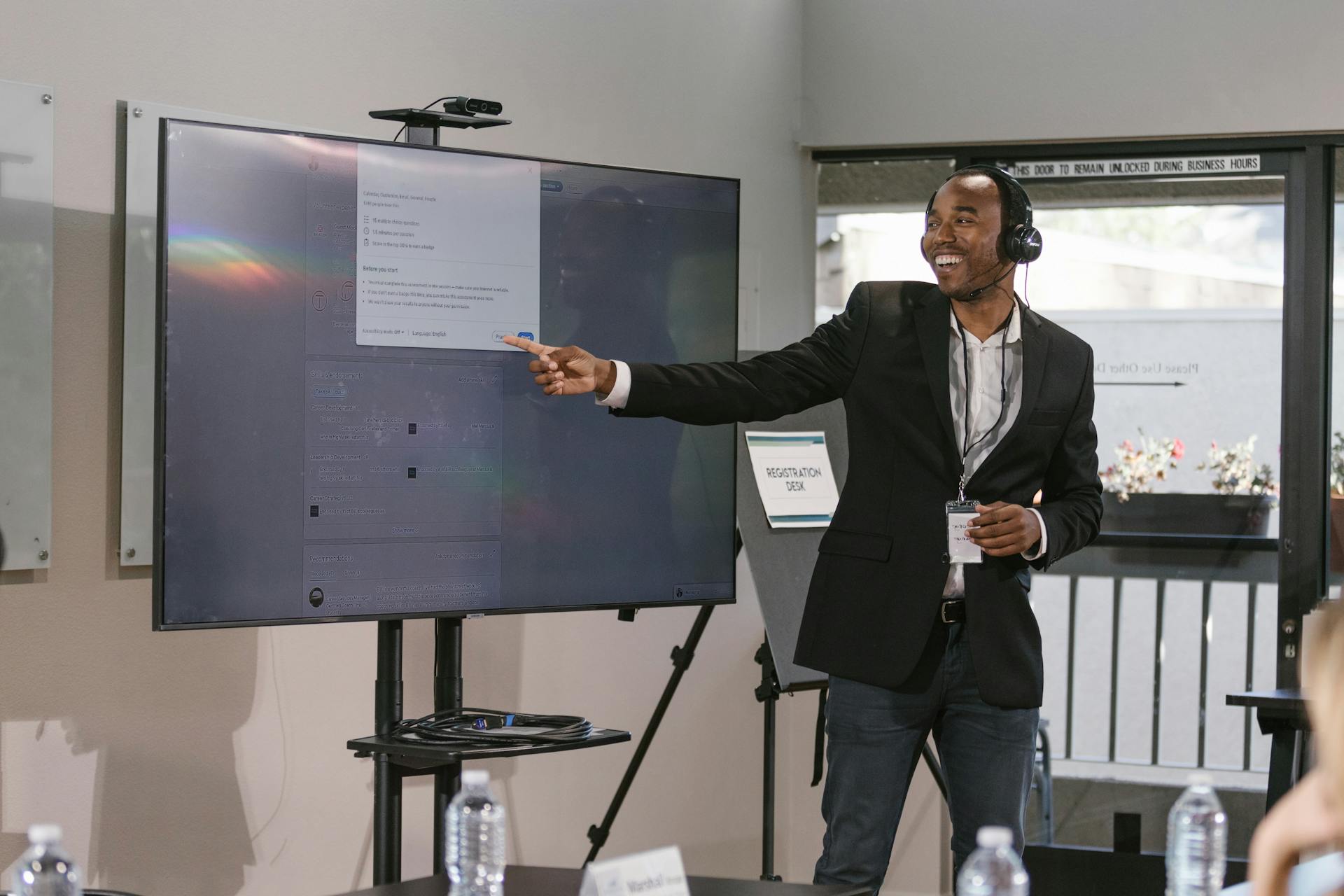
The ACM Software System Award is a prestigious honor given to outstanding software systems that have a significant impact on their field. It was established in 1983.
The award is given annually to recognize software systems that have made a major impact in their field, and have been in use for at least two years. This allows the impact of the system to be fully evaluated.
The award is sponsored by the Association for Computing Machinery (ACM), and is considered one of the most respected awards in the field of computer science.
You might like: Ccs Acm
Award Years
The ACM Software System Award has a rich history, with the first award presented in 1983. This inaugural year set the stage for future recognition of outstanding software systems.
The award has been presented annually since 1983, with some years having multiple winners.
Additional reading: Turing Prize
2016
In 2016, the ACM Software System Award was given to a team of researchers who developed the Andrew File System (AFS).
On a similar theme: Claude 3 System Prompt

AFS was the first distributed file system designed for tens of thousands of machines, and it pioneered the use of scalable, secure, and ubiquitous access to shared file data.
The team of researchers designed and built AFS in the 1980s while working at the Information Technology Center (ITC), a partnership between Carnegie Mellon University and IBM.
AFS introduced novel approaches to caching, security, management, and administration to achieve its goal of providing a common shared file system used by large networks of people.
Many universities soon integrated AFS, and it was later introduced as a commercial application.
Two foundational AFS papers were published: The ITC Distributed File System: Principles and Design, in Proceedings of ACM SOSP 1985, and Scale and Performance in a Distributed File System, in Proceedings of ACM SOSP 1987.
AFS is still in use today as both an open source system and as the file system in commercial applications, and it has also inspired several cloud-based storage applications.
Consider reading: Use Case Informatic
2017

2017 was a remarkable year for Project Jupyter, as it was awarded the prestigious 2017 ACM Software System Award. Fernando Pérez and his team were recognized for their work on Project Jupyter, a broad collaboration that develops open source tools for interactive computing.
Their language-agnostic design has made Jupyter a de facto standard for data analysis in research, education, journalism, and industry. Today more than 2,000,000 Jupyter notebooks are on GitHub.
Jupyter has also gained wide industry adoption, with companies like Google, Microsoft, Intel, and IBM releasing Jupyter-based products since 2015.
2022
The 2022 ACM Software System Award was a significant recognition of the team behind the seL4 high-assurance microkernel. This team, consisting of researchers from various institutions, received the award for their development of the first industrial-strength, high-performance operating system to have been the subject of a complete, mechanically-checked proof of full functional correctness.
The seL4 microkernel was presented in 2009 and became the first ever industrial-strength, general-purpose operating system with formally proved implementation correctness. The team's work has fundamentally changed the research community's perception of what formal methods can accomplish.
Related reading: First Ai Software Engineer

The seL4 high-assurance microkernel has been continuously maintained and grown, with continuously maintained and growing proofs on seL4 helping to give rise to a new discipline of proof engineering. This discipline involves the art of proof process modelling, effort estimation, and the systematic treatment of large-scale proofs.
The award recognizes the team's contributions to concepts and commercial acceptance, as well as their influence on the field of operating systems and formal methods.
2019
In 2019, Paul Mockapetris received the ACM Software System Award for his development of the Domain Name System (DNS).
The DNS, which he designed and built in 1983, has become an essential component of the global internet.
The number of name lookups to establish the associated IP address has increased significantly since Mockapetris's initial design.
Today, the DNS manages 350 million separately-managed domains and responds to several tens of billions of queries each day.
2020
In 2020, Margo Seltzer, Mike Olson, and Keith Bostic received the ACM Software System Award for Berkeley DB.
Berkeley DB was an early exemplar of the NoSQL movement and pioneered the “dual-license” approach to software licensing.
This innovative approach allowed for free use and redistribution in Open Source applications, and companies could choose a commercial license for support or to distribute Berkeley DB as part of proprietary packages.
The open source Berkeley DB release includes all the features of the complete commercial version, so developers building prototypes with open source releases suffer no delay when transitioning to a proprietary product that embeds Berkeley DB.
Berkeley DB has been a pervasive force underlying the modern internet since 1991, being a part of nearly every POSIX or POSIX-like system, as well as the GNU standard C library (glibc) and many higher-level scripting languages.
Check this out: Mlops Open Source
2021
In 2021, the ACM Software System Award was given to a team of researchers for their work on CompCert.
The team, consisting of Xavier Leroy, Sandrine Blazy, Zaynah Dargaye, Jacques-Henri Jourdan, Michael Schmidt, Bernhard Schommer, and Jean-Baptiste Tristan, received the award for developing CompCert, a compiler for the C programming language.
CompCert was a major advance in compiler technology, as it was the first industrial-strength compiler with a mechanically checked proof of correctness.
Award History
The ACM Software System Award has a rich history of recognizing outstanding software systems that have had a significant impact on the field of computer science.
The award was established in 1983 to honor software systems that have made a lasting impact on the field.
The first recipient of the award was the Unix operating system, which was developed by Ken Thompson and Dennis Ritchie at Bell Labs.
The award has been given annually since 1983, with a total of 37 awards given out as of 2022.
Some notable winners include the Apache HTTP Server, the PostgreSQL database management system, and the Git version control system.
These software systems have had a significant impact on the way we use computers and have paved the way for future innovations.
Broaden your view: Learning Systems in Machine Learning
Notable Recipients
The ACM Software System Award has been given to some truly remarkable individuals and teams.
The first recipient of the award was the APL team, who developed the programming language APL in 1966.
The team's work on APL was a major breakthrough in the field of computer science, and it paved the way for the development of many other programming languages.
Rashid and Tevanian Led Mach's Development

Rashid and Tevanian led the development of Mach, a pioneering operating system that won the 2014 ACM Software System Award.
Their innovative approach to virtual memory management and microkernel architecture advanced the state of operating systems.
Mach was a DARPA-funded research project at Carnegie Mellon University conducted from 1983-1992.
Rashid and Tevanian's leadership established a foundation for later operating systems on personal computers, tablets, and mobile phones.
Rashid went on to found Microsoft Research in 1991, and is Vice President and Chief Technology Officer for Microsoft Applications and Services Group.
Tevanian, formerly of Apple Inc., is Managing Director of Elevation Partners, a private equity firm.
Mach's portability and performance attributes made it possible for Apple to rely extensively on it in their operating systems for their devices.
The Mach kernel forms the heart of the Apple iOS and OS X systems.
Mach's influence can also be traced to operating systems such as GNU Hurd, and UNIX systems OSF/1, Digital Unix, and Tru64 Unix.
A different take: Machine Learning Systems Design
2016 Recipients Contributed in Big Data, Computer Vision, and Encryption
The 2016 recipients of the prestigious award were a talented group of individuals who made significant contributions to various fields.
One notable recipient was awarded for her work in Big Data, which has revolutionized the way we process and analyze large amounts of information.
Her research focused on developing new algorithms that can efficiently handle massive datasets, making it possible to uncover insights that were previously hidden.
In computer vision, another recipient made groundbreaking contributions to the field of image recognition.
Their work enabled machines to accurately identify objects, people, and scenes in images, with applications in self-driving cars and facial recognition technology.
The recipient who specialized in encryption developed new methods for secure data transmission, ensuring that sensitive information remains protected from unauthorized access.
You might like: Software for Ai Data Analysis Free
Award Categories
The ACM Software System Award recognizes exceptional software systems that have a significant impact on their field.
The award is given annually to the best software system in each of several categories.
The categories are chosen by the ACM Awards Committee, which considers various factors, including innovation, scalability, and impact on society.
The award has been given in the following categories: Systems, Applications, and Theory.
Systems category recognizes software systems that have a significant impact on their field, such as the winner in 1990, the IBM 3090 Vector Facility.
Applications category recognizes software systems that have a significant impact on society, such as the winner in 1991, the IBM 3090 Vector Facility's successor, the IBM 3090 Vector Facility II.
Theory category recognizes software systems that have a significant impact on the theory of software systems, such as the winner in 1992, the Edinburgh LCF.
Check this out: Cs Theory
Honored Developers
The 2016 ACM Software System Award was given to a group of developers for their groundbreaking work on the Andrew File System, or AFS.
AFS was designed for tens of thousands of machines, a truly ambitious project.
The team behind AFS was a talented group of individuals, including John H. Howard, Michael L. Kazar, David A. Nichols, Sherri M. Nichols, Mahadev Satyanarayanan, Robert N. Sidebotham, Alfred Z. Spector, and Michael J. West.
Minix by Andrew Tanenbaum
Andrew Tanenbaum's MINIX was a small microkernel-based UNIX operating system for the IBM PC, which was popular at the time.
It was roughly 12,000 lines of code.
MINIX included a memory manager, file system, and core UNIX utility programs.
MINIX became free open-source software in 2000.
OCaml 5
OCaml 5 was a major release that introduced shared memory parallelism and effect handlers, allowing users to combine safety and security features with significant performance improvements.
The team behind OCaml 5 focused on making the release as backwards compatible as possible, so existing users could upgrade without experiencing breakage.
This means you can upgrade to OCaml 5 without worrying about breaking your existing code.
OCaml 5 allows for parallel programming and improved methodologies for writing concurrent code, making it easier to write efficient and scalable programs.
If you're interested in learning how to use the parallelism features in OCaml 5, there are tutorials available on GitHub that can guide you through the process.
The changelog for OCaml 5 contains all the information you need to understand exactly what changes were made in this release.
Intriguing read: Code First Girls
Andrew File Developers Honored
Andrew File System (AFS) developers received the 2016 ACM Software System Award.
The developers were honored for their novel approach to shared data.
John H. Howard, Michael L. Kazar, David A. Nichols, Sherri M. Nichols, Mahadev Satyanarayanan, Robert N. Sidebotham, Alfred Z. Spector, and Michael J. West made up the team.
AFS was designed for tens of thousands of machines.
This marked the first distributed file system of its kind.
The team's work had a significant impact on the field of distributed systems.
For another approach, see: Ai for Software Developers
Sources
- https://awards.acm.org/software-system
- https://en.wikipedia.org/wiki/ACM_Software_System_Award
- https://blog.jupyter.org/jupyter-receives-the-acm-software-system-award-d433b0dfe3a2
- https://tarides.com/blog/2023-06-20-ocaml-receives-the-acm-programming-languages-software-award/
- https://awards.acm.org/about/2016-technical-awards
Featured Images: pexels.com


